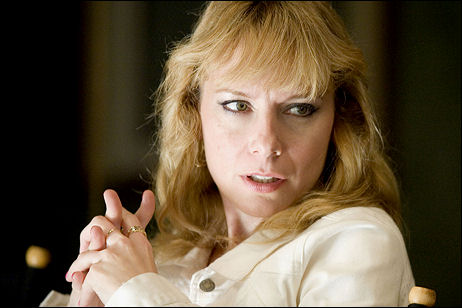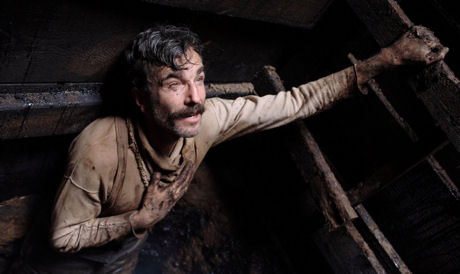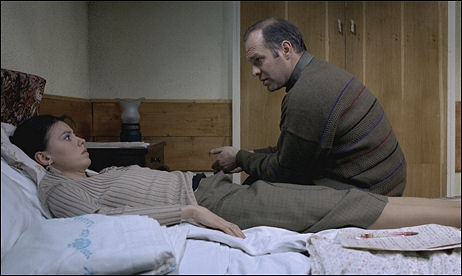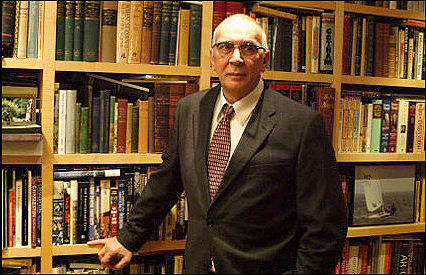Here’s hoping that something “happens” during today’s New York Film Critics Circle voting. Something along the lines of what was reported last year by Bilge Ebiri — Rex Reed‘s despair over United 93 being chosen Best Picture, the Andrew Sarris bathroom break…anything like that. If Ebiri doesn’t report something (or even if he attempts a repeat of last year’s scoop), this is an open invitation to any NYFCC member to get in touch and pass along something “good” about how the voting went down (i.e., what internecine tensions brought about what vote for what actor or film) or about some unintentionally revealing admission of some political motive or core prejudice during the voting.
Wells and O’Neil critics award podcast
The political and internecine nature of the recent critics awards (plus the National Board of Review awards last Wednesday) was discussed by The Envelope‘s Tom O’Neil and myself during a podcast recording last night.
We speculated that the L.A. Film Critics didn’t give their Best Picture award yesterday to the generally favored No Country for Old Men because (a) they didn’t want to follow in the footsteps of the despised National Board of Review, which gave its Best Picture award to No Country last Wednesday, or (b) knowing that No Country had the most headwind, the LAFCA-ers decided that There Will Be Blood (which they gave their Best Picture award to) needed their help more than the Coen Brothers and Miramax did.
In his description of our chat, O’Neil writes that “you’ll hear us laughing over the possibility that the New Yorker critics may now feel free to pick No Country on Monday since the Hollywooders didn’t do so on Sunday (the two groups admit that they try to avoid rubber-stamping each other). But if No Country fares poorly in the NYFCC voting, then…award pundits are just wrong about how the typical critic feels about that Coen brothers pic.”
I don’t agree on this point. AMPAS, HFPA and guild-wise, No Country for Old Men is a more palatable, kind-hearted and less abrasive experience than There Will Be Blood. Add this to its Best Picture critics tally so far and the Coen Bros. pic enjoys a close-to-frontrunner status right now, which is a better place to be than being a flat-out frontrunner, which nobody wants to be until early January.
I asked O’Neil what had happened to Sidney Lumet‘s Before The Devil Knows You’re Dead, as it seems to have dropped off radar screens. One reason, he said, was that it wasn’t being promoted as heavily as it needed to be by ThinkFilm. Today’s New York Film Critics Circle voting, he said, is a last-chance, do-or-die situation for the Lumet film. If it’s chosen as Best Picture or one of its actors takes an award, fine…back in the game. But if nothing happens, it’ll be adios amigos and “that’s all she wrote.”
Another Projection-Quality Piece
Another theatrical-projection-standards article referencing my 12.5 Sweeney Todd projection piece went up yesterday, this one from First Showing‘s Alex Billington. The title: “The State of Cinema: Poor Projection Quality is Here to Stay…Unless You Make a Difference.”
WAFCA Awards
The Washington, DC Area Film Critics Association (WAFCA) went earlier today with No Country for Old Men in four categories — Best Film, Best Directors (Joel and Ethan Coen), Best Acting Ensemble and Best Supporting Actor (Javier Bardem). Michael Clayton‘s George Clooney was named Best Actor (what is this…?). Away From Her‘s Julie Christie was given the Best Actress award and Gone Baby Gone‘s Amy Ryan won in the Best Supporting Actress category.
Amy Ryan is the front-runner
Okay, okay…Gone Baby Gone‘s Amy Ryan isn’t the surprise upstart in the Best Supporting Actress category any more. With four wins under her belt (from LAFCA, BSFC, NBR and the Washington, D.C.-area film critics), she’s the new front-runner. As much as I don’t personally support or agree with this, I’m Not There‘s Cate Blanchett is now the second-ranked underdog. The difference is that Ryan’s druggy Dorchester mom is a foul and offensive character while Blanchett’s “Jude” is a trip and a half.

LA Film Crix go for “Blood”
The L.A. Film Critics stood tall in the mud and adopted their usual contrarian, damn-the-torpedos stance in giving their Best Picture award today to Paul Thomas Anderson‘s There Will Be Blood — a brilliant, lacerating, suffer-no-softies art film that you need to see twice to get the full benefit of. But yay for LAFCA — it was a good thing to do for a movie that a lot of mainstream industry types may flinch at when they see it. (Which is why they’ll need to see it twice — the second time’s the charm!)

No Country for Old Men wasn’t the runner-up (The Diving Bell and the Butterfly took that honor) and that’s fine…but again, no love for poor Atonement, by any standard a non-competitor or perhaps even a weak-kneed underdog at this stage.
Variety‘s Anne Thompson wrote earlier today that LAFCA did this in response to the National Board of Review having given their Best Picture award to No Country for Old Men, not because of my Groucho Marx theory but “to seek another consensus winner…that could use their support.”
LAFCA also gave their Best Director award to Paul Thomas Anderson (the runner-up was Diving Bell and the Butterfly helmer Julian Schnabel).
The group’s Best Actor award went to Blood‘s Daniel Day-Lewis. LAFCA’s runner-up Best Actor was Starting Out in the Evening‘s Frank Langella, who won the Best Actor prize from the Boston film critics earlier today.
LAFCA’s Best Actress award went to Marion Cotillard for La Vie en Rose — no surprise there. Anamaria Marinca, the scrappy, blonde-haired star of 4 Months, 3 Months and 2 Days, was the runner-up. Marinca’s costar Vlad Ivanov, who plays the hard-eyed Mr. Bebe in Cristian Mungiu‘s film, won LAFCA’s Best Supporting Actor award with Into The Wild‘s Hal Holbrook taking the runner-up slot.

4 Months, 3 Weeks & 2 Days costar Vlad Ivanov (r.), winner of LAFCA’s Best Supporting Actor award
Gone Baby Gone‘s Amy Ryan took the Best Supporting Actress award, zotzing I’m Not There‘s Cate Blanchett for the second time today. I suspect this probably happened because LAFCA and the Boston critics both figured Blanchett was the runaway front-runner and they wanted to give Ryan a helping hand.
LAFCA’s Best Screenplay award wet to Tamara Jenkins for The Savages.
The Best Animation award was split between Persepolis and Ratatouille.
LAFCA’s Best Foreign Language Film award, no surprise, went to 4 Months, 3 Weeks and 2 Days. (How dug in are the AMPAS foreign-branch members who didn’t care for Mungiu’s film? Their will and credibility is being tested by all the awards it’s been getting lately. Will they stick to their guns and, as feared, refuse to even nominate it as one of the five, or will they cave like the consensus shape-shifters they are deep down? Either way they’re scum.)
The Best Documentary/Non-fiction Film award went to No End in Sight witn runner-up status gogng to Sicko. The Best Music award wad given to Once‘s Glen Hansard and Marketa Irglova. The Best Cinematography award went to Janusz Kaminski, for The Diving Bell and the Butterfly. The Best Career Achievement went to Before The Devil KNows You’re Dead director Sidney Lumet.
LAFCA awards are imminent
Unlike the New York and Boston critics, the L.A. film critics have never bothered with updating their award choices as they’re decided upon. As far as their website is concerned it’s still 1997. I’ll post their decisions when I get around to it. I’m heading out for some air.
Boston critics assessment
Red Carpet District‘s Kris Tapley is less impressed by No Country for Old Men having won its second Best Picture award (from the Boston Society fo Film Critics) than yours truly. I feel that the BSFC trophy strengthens an already strong case, and No Country has a bit more cultural fortification — solid tangible support from a clan of outside-the- industry knowledgables — than it did a few hours ago. Tapley says “blaaah,” the guilds are all that matter and the critics are on some kind of levitational wavelength that doesn’t really apply.

I say celebrate the now, run No Country up the flagpole and screw the guilds until their five minutes of fame arrives early next year. A movie that ends with an old lawman describing a dream about his long-dead father is a notch closer to winning a very significant place in history.
Bad projection in Salt Lake City
“How will exhibition woes be fixed?,” writes Salt Lake Tribune critic Sean P. Means. “By audiences who stop being complacent and start complaining. The first rule of effective complaining: If the film’s out of focus is to go find a manager. Don’t just yell ‘focus!’ — the projectionist is in a soundproof room next to a clattering machine and can’t hear you. If enough of the ticket-buying public raises a stink, exhibitors will get the message and start improving conditions.”
Means wrote the piece because a huge snafu in the projection of Charlie Wilson’s War for Salt Lake City critics. (The kid in the booth showed it with a 2.35 to 1 aspect ratio instead of 1.85 to 1.) Thanks for quoting from last Wednesday’s HE post about the substandard Sweeney Todd showing at the Loew’s AMC Boston Common, but I didn’t say it was “atrocious” — it was merely irritating, unarousing, substandard.
Langella’s surprise award
The Boston Society of Film Critics has my respect for giving Starting Out in the Evening‘s Frank Langella their Best Actor award. Original thinking, outside the roster of usual suspects…good stuff. Langella’s performance as an over-the-hill Manhattan novelist is very skilled, restrained and almost somnambulant — the holding-back element is why it works so well.

Two side-thoughts: Here we go again and due respect, but I don’t think Langella’s work holds a candle to Benicio del Toro‘s performance in Things We Lost in the Fire — it’s a different type of performance, obviously, but it doesn’t achieve anything like the catharsis that you get from Del Toro’s Jerry the junkie. (2) Everyone’s been assuming all along that Langella’s performance as Richard Nixon in Ron Howard‘s Frost/Nixon (out sometime in the late summer or early fall of ’08) will be a big score for him — I had thought this might kibbosh a chance of Evening acting awards this year.
Woody Harrelson’s rug
I was bored with Paul Schrader‘s The Walker, which you can’t help but unfavorably compare to Schrader’s very similar American Gigolo (’80). Woody Harrelson‘s lead fellow, an effete Southern- fried gay guy, is a huge problem. That measured Southern drawl of his, for one thing — he delivers 80% of his lines with the same inflections. And the toupee, especially. No self-respecting gay man today would wear a rug that looks like so much like a rug. It’s the kind of thing that follically-challenged actors used to wear in Hollywood films of the ’50s and early ’60s.

Boston Society of Film Critics tally
The Boston Society of Film Critics tally (keep updating this post): Best Picture — No Country For Old Men…no Diving Bell after alll! Best Director — Julian Schnabel for The Diving Bell and the Butterfly…holy crap, they’re going to give Diving Bell their Best Picture award! Best Actor — Frank Langella for Starting Out in the Evening… shocker! Best Actress — Marion Cotillard for La Vie en Rose. Best Supporting Actor — Javier Bardem for No Country for Old Men. Best Supporting Actress — Amy Ryan for Gone Baby Gone. Best Original Screenplay — Brad Bird for Ratatouille. Best Cinematography — Janusz Kaminski for The Diving Bell and the Butterfly. Best New Filmmaker — Ben Affleck for Gone Baby Gone. (Gone is a good film with a great ending, but the Beantowners should have stayed away from the hometown loyalty factor.) Best Documentary — Dan Klores‘ Crazy Love. Best Ensemble Acting — Before The Devil Knows You’re Dead.

